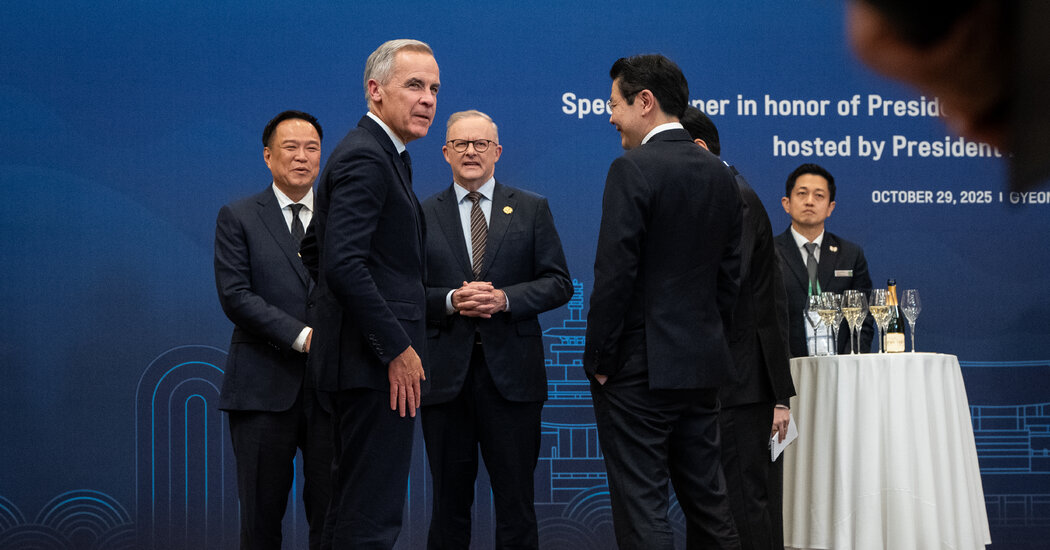As poor as Canada’s relations with the United States have been under President Trump, they are even worse with the world’s other superpower, China.
The bond between the two nations has been frayed by bitter acrimony and mistrust on both sides.
Canadian citizens have been used as pawns by China, its top leader publicly humiliated a former Canadian prime minister and the two countries are locked in a brutal tariff war. A recent poll showed that the only nation Canadians generally trust less than the United States is China.
Now there is cautious optimism around the first formal meeting since 2017 between the two nations’ leaders.
That a meeting between Prime Minister Mark Carney and Xi Jinping is even taking place is an example of how Mr. Trump’s global tariff campaign and unpredictable diplomacy have forced a once close U.S. ally to look to China.
“Trump is the invisible presence in every meeting between two leaders in the world today,” said Roland Paris, an international relations professor at the University of Ottawa. “For Canada, the primary overriding imperative is managing our relations with the United States, our closest trading partner.’’
“But if it’s possible to achieve relief on the Chinese tariffs,” he added, “then that would be a great thing.”
Still, there is reason for tempering expectations for the meeting scheduled for Friday in Gyeongju, South Korea, where both leaders are attending the Asia-Pacific Economic Cooperation forum.
When Justin Trudeau, a Liberal, became prime minister in 2015, relations between the countries had been tense because of persistent criticism of China’s human rights record by the previous Conservative government.
Mr. Trudeau made improving the relationship a top priority, but a series of events made it even worse.
In 2018, a top Chinese telecommunications executive was arrested in British Columbia under an extradition request from the United States, and then, days after, China imprisoned two Canadians. All three were released in what effectively amounted to a prisoner swap, but the episode remains a source of deep anger in Canada.
In 2022, Mr. Xi scolded Mr. Trudeau in front of a news cameraman at a reception in Indonesia, accusing him of leaking details of a brief conversation they had at an earlier reception. The exchange resembled an encounter between a stern schoolmaster and a pupil.
This year a Canadian inquiry found evidence of election meddling in Canada by China, though there was no evidence that it successfully influenced the outcomes of any votes.
More recently, China applied tariffs of up to 100 percent on canola, an oil seed that accounted for about 5 billion Canadian dollars, or about $3.6 billion, in sales last year, making it Canada’s most valuable agricultural export to China.
China went after canola after Canada’s imposed a 100 percent tariff on Chinese electric vehicles.
Despite the bad feelings, some experts believe there is room to move in a more productive direction.
“The world has changed quite dramatically compared to, let’s say, six months ago,” said Lynette Ong, a political scientist and Asian specialist at the University of Toronto.
Aside from Mr. Trump’s wave of tariffs, the most significant change, she said, is the stalling Chinese economy, which is forcing Mr. Xi to re-evaluate his country’s external relations.
“When the economy was far stronger, he had sour relations with a bunch of countries — he did not care and he could afford to do so,” she said. “Now they need to drive exports for economic recovery.”
Wang Di, the Chinese ambassador to Canada, recently said in a social media post that ending the electric vehicle tariffs would “usher in the spring of improvement” in bilateral relations. Mr. Wang, in an interview with Canadian television, said such a move would prompt China to drop its levies on canola.
Mr. Carney is also facing pressure at home. Two premiers in provinces that produce canola have asked the government to drop the electric vehicle tariff.
Canada has effectively shut out electric vehicles made in China after heavy campaigning by automakers in Detroit and Unifor, the union that represents Canadian workers.
But the tariff is protecting companies that have been withering for years, said Greig Mordue, a professor at McMaster University in Hamilton, Ontario, and former general manger of Toyota’s Canadian factories.
This month the automaker Stellantis moved production of a Jeep vehicle from a Canadian factory to the United States, leaving the suburban Toronto plant’s fate uncertain. And General Motors discontinued production of an electric van, leaving a second Ontario auto plant dark.
“General Motors used to build 1.2 million vehicles or so a year in this country as recently as 20 years ago,” Mr. Mordue said. “And now they’re down to 100,000.”
Today, about three-quarters of cars made in Canada come out of factories owned by Toyota and Honda, both Japanese automakers.
Mr. Mordue said that Canada could better sustain its auto industry through copying its policy for Japanese carmakers: gradually eliminating tariffs on Chinese vehicles if Chinese companies build plants in Canada and start producing an increasing number of cars.
Still, Canada will need to calibrate its approach to making the country more welcoming to Chinese imports. Pursuing that route would risk more backlash from Mr. Trump because of the intense global competition between the United States and China.
“The window is opening a bit and that’s up to the government of Canada to figure out if they’re prepared to try to pry that window open a little bit more and deal with the inevitable outcome,” Mr. Mordue said.
Xu Yanzhou, a researcher at the Chinese Academy of Social Sciences, told Chinese media that a major pivot by Canada toward China was unlikely because of its longstanding security dependence on the United States as well as fears of retaliation from the Trump administration.
Ottawa’s “defensiveness toward China remains prominent,” she said, “and their stance on core sensitive areas has not fundamentally shifted.”
Mr. Xi may well have other issues to raise at the meeting. Canada has used foreign investment laws to reject takeovers of Canadian companies, particularly in natural resources, as a national security concern.
Still, China’s human rights record and its effort to undermine democracies will limit what Mr. Carney could offer.
“It is a fraught challenge trying to find a basis on which to trade with a country with whom you disagree with in some fundamental ways,” said Stewart Prest, a political scientist at the University of British Columbia. “Yet the fact remains that both countries can benefit economically and politically as well from finding a common cause on which to work.”
As he left Malaysia, the first stop on a weeklong tour of Asia, Mr. Carney noted that his talks with China were “starting from a very low base” and suggested that was a plus.
“There’s no preset offer,” Mr. Carney said. ‘This is the difference between relationship and transaction. We’re starting a relationship, building up the relationship.”
Vivian Wang and Siyi Zhao contributed reporting from Beijing.
Ian Austen reports on Canada for The Times. A Windsor, Ontario, native now based in Ottawa, he has reported on the country for two decades. He can be reached at [email protected].
The post Canada’s Other Superpower Problem appeared first on New York Times.




